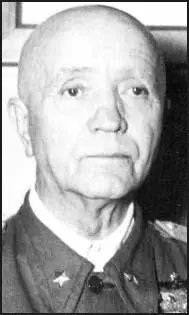Pietro Badoglio

Pietro Badoglio was born in Italy in 1871. He joined the Italian Army and was a junior officer in Ethiopia (1896-97) and Tripolitania (1911-12). During the First World War he rose from captain to general and became chief of staff to the commander in chief of the army.
After the war remained in the army but also entered politics as a senator. After expressing opposition to Benito Mussolini he was exiled as ambassador to Brazil (1924-25). Badoglio later changed his political views and returned to Italy and became head of the armed forces. He was governor of Libya (1928-33) and in 1935 led the invasion of Ethiopia.
Badoglio was opposed to Italy joining Germany against the Allies in the Second World War. He resigned as head of the armed forces after the defeat of the Italian Army in Greece.
The loss of Sicily created serious problems for Benito Mussolini. It was now clear that the Allies would use the island as a base for invading Italy. A meeting of the Fascist Grand Council was held on 24th July and Galaezzo Ciano got support for his idea that Italy should sign a separate peace with the Allies. The following day Victor Emmanuel III told Mussolini he was dismissed from office. The king now appointed Badoglio as head of the government. Soon afterwards he declared martial law and placed Mussolini under arrest.
Badoglio began negotiating an armistice with the Allies. When General Albrecht Kesselring heard the news he rushed in German troops. In danger of being captured by the German forces, Badoglio and the Italian royal family were forced to escape to Pescara where a government was set up under the protection of the Allies. On 13th October the Italian government declared war on Germany.
On 23rd September 1943, Badoglio and General Dwight D. Eisenhower signed the Italian surrender aboard Nelson off Malta. On 13th October the Italian government declared war on Germany.
Badoglio was replaced by Invanoe Bonomi in June 1944. In an attempt to unite the country against Benito Mussolini, Bonomi's government included long-time campaigners against fascism such as Carlo Sforza , Benedetto Croce and Palmiro Togliatti, the leader of the Italian Communist Party. Pietro Badoglio died in 1956.
